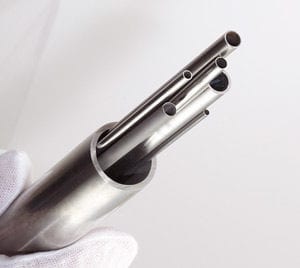
Eagle Stainless stocks both seamless and welded stainless steel tubing for a variety of applications requiring strength, corrosion resistance, and/or heat resistance. The unique characteristics of stainless steel mean different types are better suited for different applications. Why choose stainless steel? Here are some of the factors to consider when choosing the right grade:
Corrosion
What is the corrosive environment? Atmospheric, water, concentration of particular chemicals, chloride content, presence of acid. Lower alloyed grades resist corrosion in atmospheric and pure water environments; high-alloyed grades can resist corrosion in most acids, alkaline solutions, and chlorine-bearing environments making their properties useful in process plants.
Temperature
What is the temperature of the operation? High temperatures usually accelerate corrosion rates therefore indicating a higher grade. Special high chromium and nickel-alloyed grades resist scaling and retain high strength at high temperatures. Low temperatures will require a touch of austenitic steel.
Strength
What is the strength required? Higher strength can be obtained from the austenitic, duplex, martensitic and PH steels. Other processes such as welding and forming often influence which of these is most suitable. Austenitic steels (300 series) are the most formable and able to undergo a high degree of deep drawing and forming.
Choosing a Stainless Steel Grade
Types 304 and 316 are the most popular grades of stainless delivered by Eagle. 316 can be more costly with increased nickel and the addition of molybdenum. 316 proves to be more superior against chlorides and chlorinated solutions. For applications using milder acids type 304 is suitable.
Still wondering why you should choose stainless steel for your next project? Contact the experts at Eagle Stainless today!




